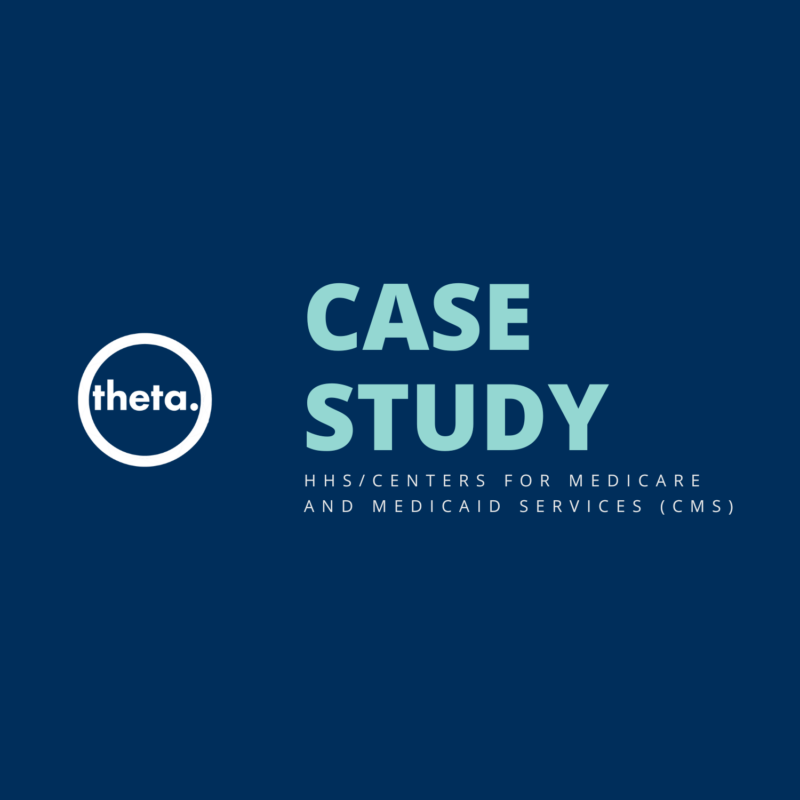
theta. – an SBA-Certified HUBZone digital integration & management firm based in Baltimore, MD, working to create a world where tech works for everybody was contracted as a subcontractor by the US Department of Health and Human Services (HHS), Centers for Medicare and Medicaid Services (CMS), Office of Enterprise Data & Analytics (ODA) in support of the Data & Analytics Strategy Group (DASG). The project, which has spanned several years and has been supported by numerous teams, was to develop and maintain the Beneficiary Claims Data API (BCDA) and the Data at the Point of Care API (DPC).
The primary objective of this project was to devise secure and efficient solutions for healthcare data sharing. The BCDA API aimed at enabling Accountable Care Organizations (ACOs) and Alternative Payment Model (APM) participants to retrieve bulk Medicare claims data securely and effectively, facilitating the healthcare system’s transition to a value-based model.
On the other hand, the DPC API was purposed to share data for treatment and care coordination, filling in the gaps with claims data to provide structured diagnoses, past procedures, and medications for Medicare patients, enhancing overall care provision.
Our specific focus at theta. was on software development services, particularly backend development and API integration. We provided software development & digital integration services that ensured smooth data retrieval and storage, efficient handling of large data volumes, and secure access to the API.
For the BCDA, we worked with the team to develop a strategic vision and product roadmap based on the users’ priorities, the feasibility of opportunities, and CMS business needs. We were integral in building, operationalizing, scaling API access, and developing secure authentication and credentialing solutions.
Regarding DPC, we focused on automating the credentialing process for providers and organizations and implementing strategies to reduce the burden while maintaining data security and privacy. We worked closely with the implementer teams, including product managers, data analysts, and other agile teams, to integrate the data into the provider’s workflows.
We helped implement cutting-edge tools and technologies to build a robust, scalable, secure system. We utilized AWS extensively, leveraging services such as EC2 for server instances, ECS for application containers, ElastiCache for a Redis database cluster, ELB for load balancing, and RDS for Postgres instances. Security was enhanced through tools like AWS KMS for key management, AWS WAF/Shield for rate limiting, and an application firewall.
Our technical services significantly streamlined data-sharing processes, ensuring that data access was limited to authorized users. This reduced the administrative burden on healthcare providers and patients, resulting in more informed care provision and improved healthcare outcomes for Medicare beneficiaries.
Moreover, our technical contribution to the DPC API allowed software developers to incorporate the code into their systems, providing crucial patient information to healthcare providers and facilitating seamless data integration into providers’ workflows.
Our software development contributions were instrumental in supporting a range of models, including the Medicare Shared Savings Plan ACOs, Next Generation ACO, Coordinated ESRD Care, Global and Professional Direct Contracting model, and the Kidney Care Choices model through the BCDA.
In April 2023, having met the objectives laid out for us, we successfully transitioned the project to a new team. Our comprehensive documentation, in addition to training sessions, ensured that the handover process was seamless and the new team could continue to manage and enhance the system effectively.
Our team utilized extensive tools and languages to build and maintain the BCDA and DPC systems. These include but are not limited to:
Overall, our software development & digital integration services significantly transformed the Medicare system through our participation in the BCDA and DPC projects, ultimately improving the experience for beneficiaries and providers. This case study is a testament to theta.’s capabilities in handling complex software development projects in the healthcare sector and delivering practical solutions that have the potential to improve care for millions of individuals.